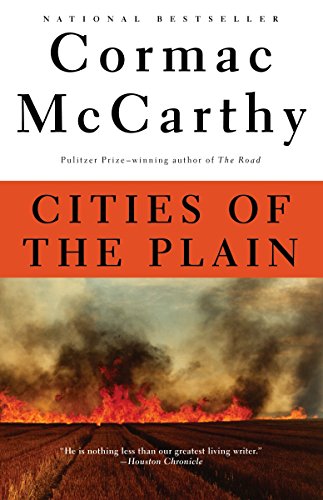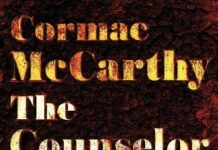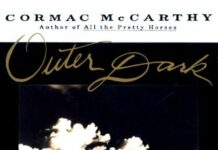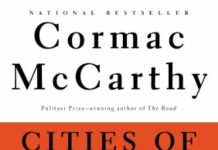
Ebook Info
- Published: 1999
- Number of pages: 292 pages
- Format: PDF
- File Size: 3.16 MB
- Authors: Cormac McCarthy
Description
NATIONAL BESTSELLER • The third volume of the award-winning Border Trilogy, from the Pulitzer Prize–winning author of The Road • A darkly beautiful elegy for the American frontierThe setting is New Mexico in 1952, where John Grady Cole and Billy Parham are working as ranch hands. To the North lie the proving grounds of Alamogordo; to the South, the twin cities of El Paso and Juarez, Mexico. Their life is made up of trail drives and horse auctions and stories told by campfire light. It is a life that is about to change forever, and John Grady and Billy both know it. The catalyst for that change appears in the form of a beautiful, ill-starred Mexican prostitute. When John Grady falls in love, Billy agrees—against his better judgment—to help him rescue the girl from her suavely brutal pimp. The ensuing events resonate with the violence and inevitability of classic tragedy. Hauntingly beautiful, filled with sorrow, humor and awe, Cities of the Plain is a genuine American epic. Look for Cormac McCarthy’s new novel, The Passenger.
User’s Reviews
Editorial Reviews: Review “An American classic to stand with the finest literary achievements of the century.” —San Francisco Chronicle”[McCarthy] is nothing less than our greatest American writer.” —Houston Chronicle”Grave and majestic…. McCarthy has created an imaginative oeuvre greater and deeper than any single book. Such writers wrestle with the gods themselves.” —Washington Post Book World “Showcases Mr. McCarthy’s gifts as an old-fashioned storyteller…. His most readable, emotionally engaging novel yet.” —The New York Times “Soars as few novels have in recent years…a work of which any writer would be proud.” —The Philadelphia Inquirer “If you love classic narrative, quest stories, adventure stories of high order transformed by one of the lapidary masters of contemporary American fiction, now is your hour of triumph.” —Chicago Tribune “Captures a way of life so unspoken and deep that most people never knew it existed–. [McCarthy] can go places in prose as remote as a mountain pass in a high wind.” —The Boston Globe From the Inside Flap In this magnificent new novel, the National Book Award-winning author of All the Pretty Horses and The Crossing fashions a darkly beautiful elegy for the American frontier. The setting is New Mexico in 1952, where John Grady Cole and Billy Parham are working as ranch hands. To the North lie the proving grounds of Alamogordo; to the South, the twin cities of El Paso and Juarez, Mexico. Their life is made up of trail drives and horse auctions and stories told by campfire light. It is a life that is about to change forever, and John Grady and Billy both know it. The catalyst for that change appears in the form of a beautiful, ill-starred Mexican prostitute. When John Grady falls in love, Billy agrees–against his better judgment–to help him rescue the girl from her suavely brutal pimp. The ensuing events resonate with the violence and inevitability of classic tragedy. Hauntingly beautiful, filled with sorrow, humor and awe, Cities of the Plain is a genuine American epic. From the Back Cover In this magnificent new novel, the National Book Award-winning author of All the Pretty Horses and The Crossing fashions a darkly beautiful elegy for the American frontier. The setting is New Mexico in 1952, where John Grady Cole and Billy Parham are working as ranch hands. To the North lie the proving grounds of Alamogordo; to the South, the twin cities of El Paso and Juarez, Mexico. Their life is made up of trail drives and horse auctions and stories told by campfire light. It is a life that is about to change forever, and John Grady and Billy both know it. The catalyst for that change appears in the form of a beautiful, ill-starred Mexican prostitute. When John Grady falls in love, Billy agrees–against his better judgment–to help him rescue the girl from her suavely brutal pimp. The ensuing events resonate with the violence and inevitability of classic tragedy. Hauntingly beautiful, filled with sorrow, humor and awe, Cities of the Plain is a genuine American epic. About the Author The novels of the American writer, Cormac McCarthy, have received a number of literary awards, including the Pulitzer Prize, the National Book Award, and the National Book Critics Circle Award. His works adapted to film include All the Pretty Horses, The Road, and No Country for Old Men―the latter film receiving four Academy Awards, including the award for Best Picture. Excerpt. © Reprinted by permission. All rights reserved. Late that night lying in his bunk in the dark he heard the kitchen door close and heard the screendoor close after it. He lay there. Then he sat and swung his feet to the floor and got his boots and his jeans and pulled them on and put on his hat and walked out. The moon was almost full and it was cold and late and no smoke rose from the kitchen chimney. Mr Johnson was sitting on the back stoop in his duckingcoat smoking a cigarette. He looked up at John Grady and nodded. John Grady sat on the stoop beside him. What are you doin out here without your hat? he said.I dont know. You all right?Yeah. I’m all right. Sometimes you miss bein outside at night. You want a cigarette?No thanks.Could you not sleep either?No sir. I guess not.How’s them new horses?I think he done all right.Them was some boogerish colts I seen penned up in the corral.I think he’s goin to sell off some of them.Horsetradin, the old man said. He shook his head. He smoked. Did you used to break horses, Mr Johnson?Some. Mostly just what was required. I was never a twister in any sense of the word. I got hurt once pretty bad. You can get spooked and not know it. Just little things. You dont hardly even know it.But you like to ride.I do. Margaret could outride me two to one though. As good a woman with a horse as I ever saw. Way bettern me. Hard thing for a man to admit but it’s the truth.You worked for the Matadors didnt you?Yep. I did.How was that?Hard work. That’s how it was.I guess that aint changed.Oh it probably has. Some. I was never in love with the cattle business. It’s just the only one I ever knew.He smoked.Can I ask you somethin? said John Grady.Ask it. How old were you when you got married?I was never married. Never found anybody that’d have me.He looked at John Grady.Margaret was my brother’s girl. Him and his wife both was carried off in the influenza epidemic in nineteen and eighteen. I didnt know that.She never really knowed her parents. She was just a baby. Well, five. Where’s your coat at?I’m all right.I was in Fort Collins Colorado at the time. They sent for me. I shipped my horses and come back on the train with em. Dont catch cold out here now.No sir. I wont. I aint cold.I had ever motivation in the world but I never could find one I thought would suit Margaret.One what?Wife. One wife. We finally just give it up. Probably a mistake. I dont know. Socorro pretty much raised her. She spoke better spanish than Socorro did. It’s just awful hard. It liked to of killed Socorro. She still aint right. I dont expect she ever will be.Yessir.We tried ever way in the world to spoil her rotten but it didnt take. I dont know why she turned out the way she did. It’s just a miracle I guess you could say. I dont take no credit for it, I’ll tell you that.Yessir.Look yonder. The old man nodded toward the moon.What?You cant see em now. Wait a minute. No. They’re gone.What was it?Birds flyin across the moon. Geese maybe. I dont know.I didnt see em. Which way were they headed?Upcountry. Probably headed for that marsh country on the river up around Belen.Yessir.I used to love to ride of a night.I did too. You’ll see things on the desert at night that you cant understand. Your horse will see things. He’ll see things that will spook him of course but then he’ll see things that dont spook him but still you know he seen somethin.What sort of things?I dont know.You mean like ghosts or somethin?No. I dont know what. You just knows he sees em. They’re out there. Not just some class of varmint?No.Not somethin that will booger him?No. It’s more like somethin he knows about.But you dont. But you dont. Yes.The old man smoked. He watched the moon. No further birds flew. After a while he said: I aint talkin about spooks. It’s more like just the way things are. If you only knew it.Yessir.We was up on the Platte River out of Ogallala one night and I was bedded down in my soogan out away from the camp. It was a moonlit night just about like tonight. Cold. Spring of the year. I woke up and I guess I’d heard em in my sleep and it was just this big whisperin sound all over and it was geese just by the thousands headed up the river. They passed for the better part of a hour. They blacked out the moon. I thought the herd would get up off the grounds but they didnt. I got up and walked out and stood watchin em and some of the other young waddies in the outfit they had got up too and we was all standin out there in our longjohns watchin. It was just this whisperin sound. They was up high and it wasnt loud or nothin and I wouldnt of thought about somethin like that a wakin us wore out as we was. I had a nighthorse in my string named Boozer and old Boozer he come to me. I reckon he thought the herd’d get up too but they didnt. And they was a snuffy bunch, too.Did you ever have a stampede?Yes. We was drivin to Abilene in eighteen and eighty-five. I wasnt much more than a button. And we had got into it with a rep from one of the outfits and he followed us to where we crossed the Red River at Doane’s store into Indian Territory. He knew we’d have a harder time gettin our stock back there and we did but we caught the old boy and it was him for you could still smell the coaloil on him. He come by in the night and set a cat on fire and thowed it onto the herd. I mean slung it. Walter Devereaux was comin in off the middle watch and he heard it and looked back. Said it looked like a comet goin out through there and just a squallin. Lord didnt they come up from there. It took us three days to shape that herd back and whenever we left out of there we was still missin forty some odd head lost or crippled or stole and two horses.What happened to the boy?The boy?That threw the cat. Oh. Best I remember he didnt make out too well.I guess not.People will do anything.Yessir. They will. You live long enough you’ll see it.Yessir. I have.Mr Johnson didnt answer. He flipped the butt of his cigarette out across the yard in a slow red arc.Aint nothin to burn out there. I remember when you could have grassfires in this country.I didnt mean I’d seen everthing, John Grady said.I know you didnt.I just meant I’d seen things I’d as soon not of.I know it. There’s hard lessons in this world.What’s the hardest?I dont know. Maybe it’s just that when things are gone they’re gone. They aint comin back.Yessir.They sat. After a while the old man said: The day after my fiftieth birthday in March of nineteen and seventeen I rode into the old headquarters at the Wilde well and there was six dead wolves hangin on the fence. I rode along the fence and ran my hand along em. I looked at their eyes. A government trapper had brought em in the night before. They’d been killed with poison baits. Strychnine. Whatever. Up in the Sacramentos. A week later he brought in four more. I aint heard a wolf in this country since. I suppose that’s a good thing. They can be hell on stock. But I guess I was always what you might call superstitious. I know I damn sure wasnt religious. And it had always seemed to me that somethin can live and die but that the kind of thing that they were was always there. I didnt know you could poison that. I aint heard a wolf howl in thirty odd years. I dont know where you’d go to hear one. There may not be any such a place.When he walked back through the barn Billy was standing in the doorway.Has he gone back to bed?Yeah.What was he doin up? He said he couldnt sleep. What were you? Same thing. You?Same thing.Somethin in the air I reckon. I dont know.What was he talkin about? Just stuff. What did he say?I guess he said cattle could tell the difference between a flight of geese and a cat on fire.Maybe you dont need to be hangin around him so much.You might be right.You all seem to have a lot in common. He aint crazy, Billy.Maybe. But I dont know as you’d be the first one I’d come to for an opinion about it.I’m goin to bed.Night.Night. Read more
Reviews from Amazon users which were colected at the time this book was published on the website:
⭐Lots of Spanish, like the two books prior of the trilogy. You don’t have to be fluent, but some vocabulary is required as McCarthy does not translate… but he masterfully transports the reader into his narrative. Heartbreakingly beautiful in verse and imagery, anybody with a romantic heart and an appreciation for the old values and integrity would enjoy this book.
⭐”Quinquagesima Sunday in the predawn dark she lit a candle and set the candledish on the floor beside the bureau where the light would not show beneath the doorway to the outer hall.”In the historic calendar of western Christianity, the Sunday before Ash Wednesday – the beginning of Lent – is known as Quinquagesima (50 days). From antiquity the church has assigned an episode from the life of Christ as recorded in Luke chapter 18 to be read on that day. Here, in so many words, Jesus tells his disciples that it’s time for his work to end; he will go to Jerusalem, confront evil and be killed. For their part, the disciples fail to grasp his meaning, though the fault it would seem is not entirely their own. Luke writes, “This saying was hidden from them.”Throughout his Border Trilogy, McCarthy has been examining the nature of things which are unable to ever be fully known, things hidden from view. Those things which, despite our inability to put a name to them or our best failed attempts to measure them, possess an ancient power. “Immanence” is what the ancients came to call it: the thought that a thing can somehow be real in the world and yet transcend that world. The idea has been troubling the minds of mystics of every progressive culture for at least five millennia, if the record is to be believed. From Abraham through Hesiod and Homer, first-century Buddhist holy men, through the ante-Nicene Fathers up through Spinoza and finding its way into the lyrics of Tom Waits. Things which are even if you can’t quite put a finger on them. Cormac McCarthy captures this spirit with an eloquence rarely witnessed in American letters.”A man was coming down the road driving a donkey piled high with firewood. In the distance the churchbells had begun. The man smiled at him a sly smile. As if they knew a secret between them, these two. Something of age and youth and their claims and the justice of those claims. And of the claims upon them. The world past, the world to come. Their common transiencies. Above all a knowing deep in the bone that beauty and loss are one.”Just prior to that incident in Cities of the Plain, John Grady has left a Mexican bordello where he has – he is convinced – found love. It is characteristic of the Border Trilogy that characters cross boundaries both geographic and mythic, leading to encounters both real and transcendent of reality. Transgression, by definition, is the result: borders crossed that must otherwise remain inviolate.And one begins to question whether this miracle of a writer is going soft; McCarthy’s view in Cities of the Plain is an unapologetic and steadily backward gaze at a world that once was, though perhaps, in reality, a world that never was and could never be. The novel is surely his most romantic work, inhabited by a protagonist resolved to fulfill a calling, quixotic as it may be. What calling? Beauty and its redemption from that which would corrupt it into something unrecognizable. In other hands this would turn into unbearable melodrama. McCarthy lets it be what it is, and lets the wheels of his characteristically dark-hearted mill grind out its result with the material it’s fed.And so John Grady sets out, determined to free a Mexican prostitute – Magdalena, by name – take her to wife, and set up home in the Jarilla hills of west Texas. His heroism, in a decidedly Greek cast, is marked by the sense that perishing in battle for a noble cause is a fate preferable than that of having one’s convictions called into question after death.Hamlet’s admonition to Horatio – “more things in heaven and earth than are dreamt of in your philosophy” – echoes here, as McCarthy balances masterfully the slow burn of a Texas ranch hand attending to the mundane, yet all the while permeating this with the understanding that more vital matters await. Indeed, once John Grady’s rescue plan has been hatched the intervening episodes transition into that inevitable ticking clock of subject-verb-object prose. Sentence after sentence the likes of “he swipes the plate with the last of the tortilla and eats it and takes his breakfast dishes to the sink”. Time passes audibly. The cowboy’s “almost blunted purpose” is palpable. McCarthy stokes the urge to jump up from one’s chair in frustration and shout at the book “go get the girl already”, though the suspicion – if not the knowledge – is strong of where that will lead.And so we are left with the quite intentional imagery of Quinquagesima Sunday, the final preparation of the devout for the hell about to be unleashed upon both the evil and the just, of lambs led to slaughter.The urge to ask why the world is this way is nearly as old as the world itself. McCarthy’s encouragement here comes with the act of dogged perseverance that marks those who inhabit his worlds. In Cities of the Plain it is clear through their actions that the desire is strong in these characters for those things which might represent order , yet the writing is never sentimental. The naturalism of McCarthy’s prose provides us with characters of a hard reality, men familiar with suffering, women acquainted with grief. Characters caught in the insularity of an impersonal universe, a persistent, dark night of the soul, but one marked by fleeting sparks of light of an ineluctable beauty.There is so much in this universe, which despite our righteous desire to uncover its meaning, can only be known when it is set to be known, set to be revealed. Only a fool would set himself to believe otherwise. Highly recommended.
⭐And you be me when I am oldThe world grows coldThe heathen rageThe story’s toldTurn the page.This is a great dedication to Cormac McCarthy’s 3rd book in his Border Trilogy and a realism of his choosing to bring it to its culmination. I’ve read a lot of McCarthy’s books and each time he “literally” blows me away.This novel is hard to capture in a review because there is so much going on and so many interesting characters and events that being too selective diminishes the novel. Since you already know the storyline, I’ll limit my review to my reactions to the novel. I love the way Cormac handles the spoken word in this trilogy. His main protagonists are two cowboys in their early to late twenties and their incessant lingo, sitting horses, and constant spitting evokes an image of this place and era (mid 1900s) that is spot on.John Grady and Billy Parham return in this final novel to draw together the first two books and round out the life of the two cowboys presently punching cattle for a widower rancher. Since this kind of life in southern New Mexico’s hard scrabble land is harsh, it was good to see that their employer took great pains to keep good care of them, feeding them well, respecting their opinions, especially his favorite–John Grady. John Grady was my favorite as well and I don’t think they make many like him anymore: handy, polite, respectful, resilient, humble but confident, excellent at breaking and/or getting the best out of horses and dogs and people, dependable, hard working, faithful and passionate to a fault.The story covers many aspects of a life of ranching but focuses on Billy and Grady’s friendship told in the fierce beauty and desolation of countryside that few could capture, as does McCarthy. The story is peopled with interesting characters that are fleshed out so that you feel you know them almost as well as the main characters.McCarthy can capture the typical speech patterns of unschooled cowpokes as easily as he does the visceral complex conversations that populate the book. “Daybreak to daybreak for a godgiven dollar, said Billy. I love this life. You love this life, son? I love this life don’t you? Cause by god I love it. Just love it.”John Grady’s demeanor charms most of the other characters including an old blind maestro he meets in a whorehouse/bar. Grady grows so fond of the maestro that he asks him to serve as the padrino for his bride. The maestro’s thoughtful explanation upon being asked but refusing to be the padrino gives insight into McCarthy’s ability to use words like few writers today. “He was not a man given to illusions He knew that those things we most desire to hold in our hearts are often taken from us while that which we would put away seems often by that very wish to become endowed with unsuspected powers of endurance. He knew how frail is the memory of loved ones. How we long to hear their voices once gain, and how those voices and those memories grow faint and faint until what was flesh and blood is no more than echo and shadow. In the end perhaps not even that.He knew by contrast that our enemies seem always with us. The greater our hatred the more persistent the memory of them so that a truly terrible enemy becomes deathless. So that a man who has done you great injury or injustice makes himself a guest in your house forever. Perhaps only forgiveness can dislodge him.”Brush up on your Spanish because there is a lot of it in the storyline that isn’t translated. Most can be figured out by the words or the context but this twist, so like McCarthy, added a degree of reality to the book, that while a tad frustrating at times, added to the overall atmosphere.It was hard to put this novel down. In fact, I reread many parts and they still continue to elicit the same deep wrenching, almost reverent, responses. While the story often brings a chuckle and the action never abates, it is the ending that will bring you to your knees. While it wasn’t what this reader may have wished for the two friends, it would appear this was really the only end to the paths that each had chosen. “Men imagine that the choices before them are theirs to make. But we are free to act only upon what is given. Choice is lost in the maze of generations and each act in that maze is itself an enslavement for it voids every alternative and binds one ever more tightly into the constraints that make a life”
⭐Cities of the Plain concludes McCarthy’s much-lauded Border Trilogy. Once again we are in the sparse, unforgiving territory of the US/Mexico border, bringing Billy Parham’s story into the 1950s and the wider social change that took place. As usual, it is a book of brilliant, cinematic writing, steeped in the power of landscape and animals, but also spoiled in places by semi-religious and surreal pontificating that takes the story nowhere.
⭐Frrom boyhood when I used to watch Westerns with my Dad on a 12″ screen B&W TV I have been a lifelong aficionado of novels and films about the American West. I love Cormac McCarthy’s Border Trilogy, having read each of the 3 novels in sequence, I have no doubt that I will re-read them. McCarthy’s use of language is brilliant, poetic, and my advice is to savour his writing, resisting the temptation to turn the pages too quickly while following the action. The novel deals with time-honoured themes of loyalty, courage, love and death. Buy Cities of the Plain.
⭐As the final book of the trilogy, Cities of the Plain is perhaps slighter than the first two stories – but no less moving and tragic for that. McCarthy offers us little hope in the stories of John Grady Cole and Billy Parham, both essentially good characters who suffer for their love of horses and the cowboy way of life. The ending is somewhat arcane and you need to stick with it to discover the message of the entire trilogy. I can give this work no higher endorsement than to say that I started riding lessons as a result of the way he describes man’s complicated relationship with the horse!
⭐This is the concluding book in the trilogy, and is a superbly eloquent telling of the final part of the story of the central characters. It is achingly beautiful in the simple language and un fussy prose used to tell the tale of exhausting physical work, grand landscape, and men of few words. I was lost when it was finished.
⭐McCarthy brings everything to life, I have never been there and probably never will, but I see the countryside and feel its emptiness and small kindnesses and daily struggle
Keywords
Free Download Cities of the Plain: Border Trilogy (3) in PDF format
Cities of the Plain: Border Trilogy (3) PDF Free Download
Download Cities of the Plain: Border Trilogy (3) 1999 PDF Free
Cities of the Plain: Border Trilogy (3) 1999 PDF Free Download
Download Cities of the Plain: Border Trilogy (3) PDF
Free Download Ebook Cities of the Plain: Border Trilogy (3)





